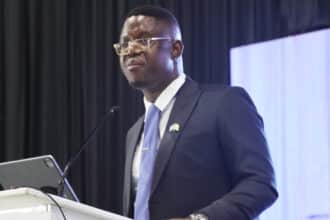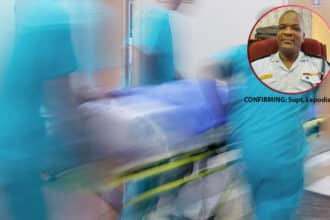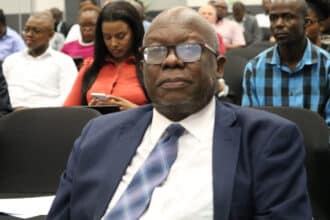Her Excellency, Sian Price was appointed British High Commissioner to the Republic of Botswana and UK Special Representative to SADC in February this year.
Price is no stranger to the region, having previously served in South Africa and Zambia.
The Voice’s Portia Mlilo recently caught up with the amiable ambassador to learn a little more about her role and her time in Botswana to date.
You’ve previously served in Bangladesh, South Africa and Zambia – how does Botswana compare?
Bangladesh was fascinating, but my heart belongs to Southern Africa. I loved my time in Zambia and South Africa and I’m really enjoying learning about Botswana. We came here from Pretoria so there are lots of similarities and lots of differences, economically, societally and culturally.
The difference we are enjoying most as a family is the ability to move around safely and easily. I can walk my son to school here, and I go on foot to many of my meetings.
So was it your choice to come here? What did you know about Botswana prior to your posting?
Postings for us are a competitive process. We apply for roles we are interested in and have to undertake interviews etc, just like in any other sector.
I only applied for jobs in Southern Africa and made it very clear to everyone that Botswana was my top choice – so I was absolutely delighted when they called to tell me I got the job!
I first came to Botswana in 2006 on my honeymoon. We married in Zambia and decided against the more typical beach holiday, opting instead for a six-week road trip around Namibia and Botswana.
It was a fantastic experience and I’ve been admiring your country from afar ever since!
The UK will spend the month of November in lockdown – what economic repercussions do you think this will have? Do you envision something similar happening here?
The UK is made up of four nations: England, Northern Ireland, Scotland and Wales. England will spend November in lockdown.
It will definitely be tough economically; particularly for those working in the retail and hospitality sectors, but it’s sadly unavoidable.
We needed a second lockdown as the virus was spreading too rapidly across the country and there was a legitimate risk that, without further action, our mortality rates would have been even higher than during our first wave back in April.
It is a very different situation here in Botswana. But just like the UK, your government will make its decisions based on virus transmission rates and health care capacity.
What has your office done to help Botswana during these difficult times?
The UK’s focus has been on supporting the WHO and the wider UN system to lead an effective, evidence-based response globally.
We strongly believe that a coordinated international effort is the best way to respond to this pandemic.
We have also prioritised the development of new vaccines, therapeutics and diagnostics –making sure that access to these, when available, is fair and equitable.
Here in Botswana, we have supported the WHO’s work to ensure border posts are equipped and ready to re-open safely.
We have sponsored NGOs working on areas that were already a priority for the UK and Botswana – like tackling Gender-Based Violence, providing youth employment, or supporting SMME development – and helped them respond to the new challenges posed by Covid.
Also, the UK’s Trade Forward, Southern Africa Programme, which will be formally launched on 18th November, is working with the Ministry of Investment, Trade and Industry on identifying policy reforms to help businesses weather the Covid storm.
Nine months into your role as High Commissioner, how are you finding it? What have you been able to achieve and how has Covid-19 affected your duties?
It has certainly been a very unusual time to start a new role. As a High Commissioner, much of your first year is spent getting to know the country, establishing your networks and building your understanding of the opportunities for partnership and collaboration.
Covid is making that a bit trickier than usual, the large meetings and events where we would usually meet people aren’t happening.
But that just means I have to work a little harder at it. I’ve still managed to meet a wide range of fascinating people from all sectors of society, who have all helped with my ‘Botswana education’ as I call it.
For our priority areas, I’m still finalising specific plans and need to discuss some areas of proposed activity further with your Ministers, but the themes that are coming up most prominently are around: supporting Botswana’s economic recovery and promoting regional trade; climate change and climate resilience; and protecting biodiversity and combatting the illegal wildlife trade.
But that doesn’t rule out other areas of collaboration – I’m always open to new suggestions!
High Commissioner is an impressive title but what does the role actually entail? Take us through an average day in the life of an HC?
Every day is different! But the average day for me consists of lots of meetings: with Government Ministers – to identify new areas of UK/Botswana collaboration; with UK businesses that want to invest in Botswana – to provide them with advice about the market here; with UN country representatives and civil society leaders – to explore how the UK can further support their work; and with journalists and academics – to learn more about the country.
Occasionally I get out to see a bit more of the country and visit projects etc, but not as much as I’d like to due to Covid!
I know the British HC are very proud of the Chevening Programme – what impact do you think it has had?
We are very proud of Chevening, it’s our flagship scholarship scheme.
Its impact can be measured in the leadership positions our scholars attain as their career’s progress, but, more importantly, by the difference, they make here in Botswana on their return.
You will find Chevening scholars in all walks of life in Botswana and at all levels of leadership, from the President down!
As well as making an impact in their own fields of expertise, Botswana also has one of the most active alumni associations globally.
Our alumni here work together to delivers a wide range of projects in their communities and are incredibly powerful as a network due to their diversity.
They also help inform the UK’s work here. When I want to learn more about a particular sector in Botswana, more often than not it will be a Chevener I call first!
Have you had a chance to travel around Botswana yet? What were your impressions?
I’ve managed to make a couple of trips outside of Gaborone, but I’m looking forward to seeing a lot more of the country over my four years here.

The Okavango Delta was, of course, a highlight in our travel so far – it’s just as amazing as it was when I first visited in 2006.
And you’re here with your family?
I’m here with my husband (sadly he is not ‘Mr Price’ and I am not the heir to a retail dynasty!) and our 2 little boys – who are four and seven.
They absolutely love Botswana and are really enjoying their time here.
The wildlife, of course, is the big attraction for them – but being able to spend so much time outdoors, even here in Gaborone, makes them very happy!
Botswana has a proud reputation as being the least corrupt nation in Africa. However, that image has been harmed by allegations of widespread corruption in recent years – how do you view the current regime?
Globally, corruption continues to be one of the main obstacles to sustainable economic, political, and social advancement, affecting developed and developing economies alike.
Botswana is right to be proud of its ‘least-corrupt’ reputation, but no country can afford to rest on its laurels.
The UK considers itself a world leader in combatting corruption, but we are constantly looking at how we can get even better at tackling it in all its forms, both at home and overseas, and we will do whatever we can to support Botswana’s efforts in this space.
And have you had the chance to meet up with your ‘homeboy’, former President Ian Khama?
I haven’t met any of the former Presidents yet – but I’m looking forward to meeting both former President Khama and former President Mogae when the opportunity arises.
Covid-19 is making introductory calls a little more challenging to arrange than they used to be!
The UK abolished the Death Penalty back in 1965 but Botswana still enforces it and shows no sign of stopping any time soon. What are your views on capital punishment?
I don’t think you will be surprised to hear that I’m opposed to capital punishment.
It has been a longstanding policy of the UK Government to oppose the death penalty, in all circumstances, as a matter of principle.
We believe that the use of the death penalty undermines human dignity, that there is no conclusive evidence of its deterrent value, and that any miscarriage of justice leading to its imposition is irreversible and irreparable.
I am very conscious that the Government of Botswana holds different views on the death penalty, but am grateful that they remain open to full and frank discussions on this issue. For me, that is a sign of a mature partnership.
The UK and Botswana aren’t always going to agree on everything, but we will always listen and try to understand each other’s perspectives.
What do you miss most about the UK? And at least?
I miss my family the most, particularly over the last nine months when going back to the UK for a visit hasn’t been possible.
My sister had a baby girl last month, so I can’t wait to get back and meet her – so that Auntie Sian isn’t just a blurred image on WhatsApp!
I miss the weather the least – particularly this time of year when we have weeks and weeks of grey days.
I’m from Sedgefield, a small town in the North East of England. Well, it’s more of a village really! It’s quiet and rural.
I couldn’t wait to escape when I was a teenager, but now I dream of returning to live there with my own children! My parents are still there, but my wider family are spread all over England, Scotland and Wales. The only place we don’t have covered in Northern Ireland!
Having worked under both a Labour and a Conservative government, which one do you prefer?
I am a civil servant, and therefore, politically neutral. It is our role to advise and assist the government of the day, whichever party they come from.
Now that the UK has officially left the EU, 2021 is set to be a new start – as briefly as possible, explain to our readers what leaving the EU means for the UK?
The short answer is that it will give the UK more flexibility to invest our time and resources in the areas of policy, development, legislation, trade agreements and bilateral relationships that matter most to us.
This will, of course, include maintaining a strong relationship with the EU and its member states – we still have many shared values.
Away from the office, how do you relax? I know the English love their cricket…….
I’ve never been a big cricket fan! I love reading, I like to bake – though these days the kids usually want to ‘help’ so it’s not quite as relaxing as it used to be! Since I arrived in Botswana I’ve taken up bird watching. It was a great distraction during the lockdown and I still find it very relaxing.
The English Premier League is incredibly popular here – do you follow football?
I’m afraid I don’t. My father is a Welshman, so rugby has always been my sport.
I grew up watching him play, and took up rugby myself during my university days – though I’m too old for it now!
And finally, Thank God It’s Friday – what are your plans for the weekend?
Weekends for me are all about family. Saturday night is always movie night in our house; we will make pizza together and watch a Disney movie (the boys have chosen Aladdin for this week).
We will also go to the library and choose books for the kids, bake cakes or cookies, play in the garden and generally just hang out together as a family and recharge our batteries for the week ahead.







